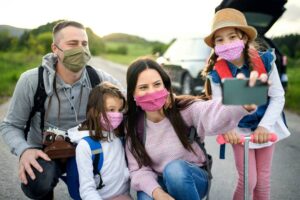Should You Travel With Unvaccinated Kids?
While a growing number of adults are getting vaccinated for COVID-19, most kids are still waiting to be eligible.

According to kids news agency,COVID-19 vaccines for younger children are on the way. Until then, vaccinated adults are left trying to figure out where and how to safely travel with the younger members of the family.
This week, Pfizer made two very important announcements regarding COVID-19 vaccines for children: The two-dose vaccine is expected to be available to those 12 and older as early as this month (right now it’s available to kids 16 and older) and to children ages 2 to 11 from September.
While that may come as welcome news for families with younger kids still waiting for their chance to be better protected during the pandemic, it also presents a bit of a dilemma—should families with vaccinated adults go ahead and travel with the unvaccinated younger members of the family or wait it out?
When asked if it’s safe for vaccinated parents to travel with unvaccinated children, Dr. Amesh Adalja, an infectious disease expert and senior scholar at the Johns Hopkins Center for Health Security, says, “I think it’s relatively safe to do. Children tend to be spared from the severe consequences of disease and they tend not to be spreaders.”
He adds that due to strict masking policies and proper ventilation on airplanes, “I don’t necessarily think that an unvaccinated child has to forego flying on an airplane because of COVID risk—planes have become relatively safe places when it comes to COVID-19.”
According to Dr. Nipunie Rajapakse, a pediatric infectious diseases specialist at Mayo Clinic Children’s Center, how safe or unsafe it is to travel with unvaccinated children will depend on several factors. They include:
Any underlying health conditions children may have: These may increase the risk of having more serious illness due to COVID-19.
Where you are traveling to: “For example, there are large outbreaks going on in some countries like India right now and travelling to those locations would not be recommended,” says Dr. Rajapakse.
How you are traveling: You are likely to come into contact with fewer people if you travel by road versus traveling through a busy airport or on a full airplane, she notes.
What you plan to do at your destination: “For example, doing a lot of outdoor activities like camping or hiking is much lower risk than traveling to attend a wedding or other large gathering,” Dr. Rajapakse says.
But, she also adds, “It has been a really difficult year for kids and families as they have missed out on a lot of things that are not only enjoyable but important contributors to the social, emotional, and physical health of kids like attending school, playing sports, and spending time with friends and loves ones—so each family needs to weigh the risks and benefits of travel during this time.”
Indeed, after more than a year when many families have opted to stay closer to home due to the pandemic, the desire to get back out into the world and reconnect with people and places is stronger than ever—especially as a growing number of parents and grandparents become vaccinated and are feeling increasingly confident traveling themselves.
“COVID-19 was a trauma-inducing experience for most people. Not seeing grandparents and loved ones is very hard on people,” says Rainer Jenss, founder of the Family Travel Association. He adds that the pandemic has “created a strong desire to reconnect [in person] with loved ones.”
More than half (52 percent) of families are planning a trip between June and September this year, and 60 percent are planning on taking a longer trip in the near future, according to a March 2021 survey of its members released last month by online family travel community Bébé Voyage.
Nevertheless, fears and concerns about COVID-19 persist. About 97 percent of the survey’s respondents said they remain very worried or somewhat worried about COVID-19 as it relates to their travels.
“There is a big chunk of the community that are absolutely happy to risk traveling as long as the parents are vaccinated and you do negative tests for the kids,” says Marta Conte, editor-in-chief at Bébé Voyage. But, she adds, “There is a small faction that is also worried about what is going to happen if [unvaccinated] kids start spreading it.”
How families can reduce their COVID risks when traveling
For families who do plan to travel, Dr. Rajapakse says there are ways that they can reduce their risk, “though it is generally difficult to completely eliminate risk at a time when we are still seeing a lot of virus circulating.”
Whether vaccinated or not, everyone in the family should continue to wear a mask that properly covers their nose and mouth in public places, including in airports, on airplanes, trains, buses, and in common areas in hotels, advises Dr. Rajapakse. Travelers should try to avoid crowds and keep six feet of distance from others when possible. Washing hands frequently with soap and water, using an alcohol-based hand sanitizer, and disinfecting frequently touched surfaces—for example, around your seats on an airplane—continue to be important tools in the battle against COVID-19.
“You may wish to consider [a] lower risk mode of travel like by car or RV instead of by airplane. You can also plan to do lower-risk activities like camping, hiking, or any activity that takes place outdoors rather than indoor activities where you may be exposed to crowds like visiting a museum or theater. Mealtimes are a particularly high-risk time as you will have to be unmasked while eating—it is important to plan ahead and ensure any restaurants or places you are planning eating [at] have adequate distancing and that staff are masked and following appropriate precautions,” says Dr. Rajapakse.
For families with smaller kids who are considering getting back into the skies, one big area of concern is whether their unpredictable toddlers and smaller children will properly comply with air travel mask mandates. (The major U.S. airlines all have strict mask policies in places for all passengers, including kids ages two and older, and it is also required by the federal government.)
“Parents are definitely concerned about children wearing masks and how [smaller kids are] going to handle it,” says Jenss.
One popular piece of advice circulating in parenting groups regarding the mask issue is: Practice makes perfect. Parents and caretakers who know they have an upcoming flight with the wee ones can work on troublesome toddlers in environments such as playgrounds where they can practice getting them to wear their masks—and keep them on.
Dr. Rajapakse also reminds family travelers that the U.S. Centers for Disease Control and Prevention (CDC) recommends unvaccinated travelers get a COVID-19 test 1 to 3 days before their trip and 3 to 5 days after travel and to stay home for 7 days after travel (if they get tested) or 10 days (if they don’t).
“You should cancel any travel plans if anyone in the family is sick, was exposed to COVID-19, or tests positive for COVID-19,” says Dr. Rajapakse.
Where can families travel in 2021?
In addition to the public health concerns that traveling with unvaccinated children may present, there is also the issue of logistics. Some countries that have begun to open back up to international travelers are asking that those travelers present proof of COVID-19 vaccination. There are cruise lines and tour operators that have begun implementing mandatory vaccination policies as well. Where does that leave kids who don’t even have access to vaccines yet?
When it comes to official government policies regarding travel restrictions for kids amid the pandemic, often “there is no clear guidance,” says Conte. “This is why everyone is asking, ‘What’s happening with the kids? What documents do we need?’ A lot of time there is no information at all. Kids are very much left behind.”
Lidiya Ivanova, founder and travel concierge of Grand Cayman–based Barefoot Journeys, says that the fact that each destination has a different set of rules, not just in general but also as they apply to children, makes planning travel for families extremely complicated.
“Currently, age [requirements] for testing are different for different destinations, which brings out a lot of extra stress and panic onto travelers, [especially for those] that have to transit or enter multiple countries,” says Ivanova, adding that her role as a travel advisor has become increasingly important and relevent for this very reason as she helps families navigate all the complexities.
Families who wish to travel to Europe this year did get one bit of hopeful news this week at least.
An official proposal made by the European Commission on May 3 for opening Europe’s external borders this summer to vaccinated non-EU travelers included an exception for unvaccinated children—the Commission suggests that unvaccinated children should be able to travel to Europe with their vaccinated parents if they provide proof of a negative PCR COVID-19 test.
For countries that are already welcoming vaccinated travelers, the policies vary. Iceland, for instance, states that children who are 16 or younger must submit to a COVID-19 test upon arrival into Iceland regardless of whether they are vaccinated (their vaccinated parents or adult caretakers must do the same). There is no exception for very young children or babies.
Greece began a phased reopening of its borders to international travelers on April 19. The Greek government’s policy is that vaccinated travelers from the United States (and several other approved countries) can enter without proof of a negative COVID-19 test result. Those who are not vaccinated must provide a negative COVID-19 PCR test result, with the exception of children ages five and younger.
But even if there are exceptions made for unvaccinated children, constantly changing international travel restrictions and the confusion and concerns they create mean that many families who feel confident traveling are simply opting for domestic vacations instead this year, according to Jenss.
“The big concern is getting stuck. What if we’re in Mexico and we can’t go back because they’re closing the border? That continues to be a big issue,” says Jenss. “That’s why certainly international [travel] isn’t really going to rebound until next year.”
Travel within the U.S. is less of a challenge because there are only a small handful of states that still have domestic COVID-related entry requirements in place, incuding Hawaii, Vermont and Rhode Island. Hawaii has a pretravel COVID-19 testing requirement for domestic arrivals and kids age four and under are exempt. Vermont and Rhode Island require all unvaccinated travelers arriving in those states to provide a negative COVID-19 test result, children included. Chicago also has a testing requirement for unvaccinated travelers coming from states on its “orange list” and children are not exempt. But the vast majority of U.S. states do not have any COVID-19 travel requirements, and instead simply recommend that unvaccinated travelers get tested and/or quarantine as per the CDC’s advice as an added precaution.
Jessica Griscavage, CEO of Runway Travel, says her family travel clients are not shunning international travel completely, opting for vacations in the Caribbean and Mexico.
Travelers to Mexico from the United States do not need to present a negative COVID-19 test result, proof of vaccination, or quarantine. They are subject to a health screening upon arrival and must submit to the U.S. international travel requirement of providing a negative COVID-19 PCR test result procured no more than three days prior to boarding their flight back to the U.S.— kids under two years of age are exempt.
For the Caribbean, requirements vary depending on the destination. For instance, to enter the Bahamas, unvaccinated travelers must provide proof of a negative COVID-19 PCR test taken no more than five days before their arrival date, and children 10 and under are exempt.
“Our clients are comfortable in destinations where they can spread out on a beach and have the opportunity to dine outdoors. Travelers are looking for wide open spaces,” says Griscavage. Domestically, her clients are booking Hawaii and U.S. national parks. She adds that many dude ranches are already fully booked for the 2021 season.
With many families traveling domestically instead of abroad this year, Jenss notes that is why, “You can’t get a vacation rental on Cape Cod or in the Carolinas, and some places in Florida.” The pent-up demand for travel is “starting to blow up,” which means many domestic vacation options have already booked up for the summer.
Cruising is also a big question mark for families in 2021, another factor that could be funneling families who might normally cruise to hotel, resort, or vacation rental options instead.
In late April, the CDC issued updated guidance for cruises to be able to restart sailings from the United States. The agency says ships that can show that 98 percent of crew and 95 percent of guests are vaccinated will likely be able to start cruising again sometime this summer. The 5 percent wiggle room from the CDC would mean only a very limited number of unvaccinated youngsters onboard, which obviously presents issues for cruise lines that attract families—and for families who were hoping to cruise anytime soon.
Royal Caribbean and Celebrity Cruises, which have announced plans to sail in the Caribbean and Europe this summer, are not requiring vaccines for those under age 18 on those international sailings. Those younger passengers will have to submit to COVID-19 testing protocols instead.






ارسال نظر